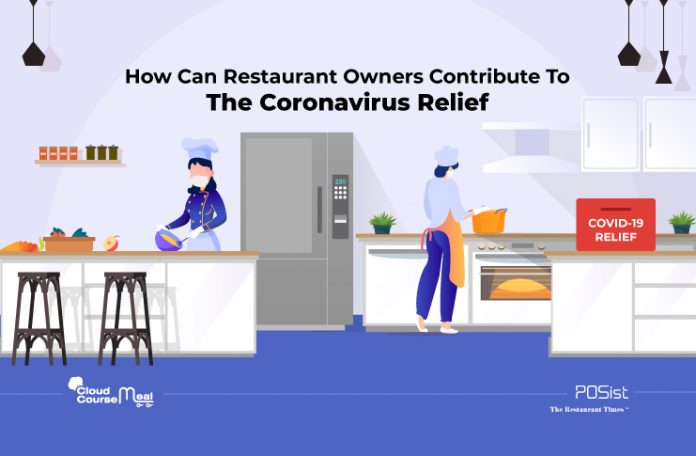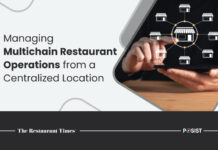With Coronavirus cases multiplying across the globe, the scenario of loss of livelihood as a result of this pandemic is causing anxiety and fear. Several organizations and teams are working round the clock to support the needy. An overview of the precautions restaurants need to take while contributing to society are mentioned below:
- Wear masks and gloves at all times when you’re outside.
- Carry extra gloves, masks, and sanitizers for people.
- Have them maintain the necessary distance even while waiting in the queue.
- Ensure the packaging is durable and disposable
- Remember to remind customers to discard the packaging as soon as they reach home
- Don’t let people gather in large groups in a small area. You can use other team members/family members to set up distribution points at a distance.
- Identify the hotspots near your area, and inform others about it well in advance. The government and organizations are mostly using schools or other public places to distribute food.
- Target a smaller group of people, and ensure that you make minimum contact with them. Ask them to ensure the same.
- Stay indoors as much as possible.
Along with these precautions, here are some things you should deeply reflect on before stepping out to contribute to society.
Contributing To Feeding The Needy Safely
Here are some measures you can take to avoid any further transmission of coronavirus.
1. Take Necessary Precautions For Yourself And Others
Many public service organizations have set up a COVID-19 Response Fund for raising money for the needy sector of society. These organizations generally take all the necessary precautions to avoid any further transmission of the disease. Essential supplies like masks, gloves, and sanitizers are necessary precautions that you need to take.
You need to have proper disposable containers for the food you need to distribute. In case, you are planning to distribute raw materials like wheat, rice, or other pulses, ensure that you have packaged them well. Any negligence while the packaging may put both you and the one you’re trying to help at risk of contracting the virus. Along with that, make sure that you inform people about disposing of the packaging as soon as they get home since it can be infected as well.
Ask them to sanitize their hands, provide them with masks and gloves in order for them to stay safe. Maintaining social distancing is really important while you distribute food or other necessities. Make sure that when people queue up, they stand at least 1 meter away from each other.
2. Prepare But Don’t Overstock
Several for-profit and non-profit organizations are preparing to support the needy in their own way. However, it is also essential to maintain a balance between helping the needy and overstocking. You should not be emptying the grocery stores in order to support the needy as it could create an artificial shortage for the rest of society.
Other than that, each household can do their bit for the needy by cooking a little extra and giving it away. This thought has been the driving force behind the volunteer work led by IT professional Navdeep Singh through his initiative- Two meals extra.
Singh, along with other volunteers, has been providing meals to migrants and daily wage laborers. Even gurudwaras and temple trusts are providing shelter and food for the needy. A month back, Singh was collecting 15 meals a day from donors. As of now, he provides more than 1000 meals to schools in slum areas, where the condition is pathetic.
Interestingly, Singh has teams working for him in different operating areas. “The ones (volunteers) distributing in Baner get a fair idea of how many packets need to be provided there. That way, we know how much of the remaining provisions can be distributed in Aundh, Hinjewadi, Tathewadi, and so on. After collecting the food, volunteers come to a common point, and the distribution team takes it forward,” he explains.
3. Reach Out To The Needy
Despite your best efforts to support the needy, you might not always find the ones that are most affected by the pandemic. It is important to identify hotspots or areas where assistance is needed the most. This is especially true of developing countries where millions are vulnerable to the disease.
Some NGOs in Pune like Saad Pratishthan, had been distributing both cooked food and raw ingredients to transgender people, sex workers, migrants, and other needy people. They are specifically targeting the most neglected sections of society.
Throwing light on the same, Amit Dhole, trustee, Saad Pratishthan, says “Currently, we are distributing around 1100-1200 cooked meals and 2,600 packets of raw ingredients, which is sufficient for a family for a month.” They have also distributed 1100 health kits. “We are trying to identify people who do not have a voter ID card or ration card. That’s our priority,” he says.
All in all, the challenges that lie ahead in terms of relief and rehabilitation are immense. We need to stand against the virus together and help each other out of this crisis. Having said that, it is critical that all basic safety precautions must be met while distributing food and other supplies.


















